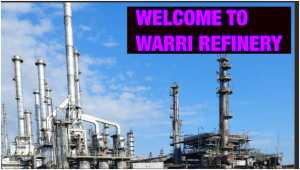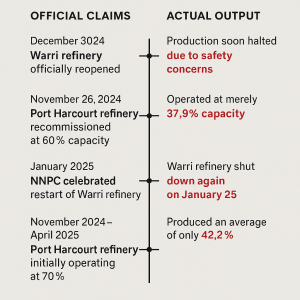By IDNN Investigations Unit | April 29, 2025
The Warri Refining and Petrochemical Company (WRPC) has remained non-operational since January 25, 2025, less than one month after a high-profile relaunch. Its shutdown, reportedly caused by safety issues within its Crude Distillation Unit, has raised fresh alarms about the operational credibility of Nigeria’s state-owned refineries, despite hundreds of millions of dollars in rehabilitation funding.
Simultaneously, the Port Harcourt Refining Company (PHRC), which resumed operations in November 2024, is struggling to operate above 40% capacity, contrary to claims made by the Nigerian National Petroleum Company Limited (NNPCL).
Warri: The Shutdown Nobody Saw Coming

Touted by former NNPCL GCEO Mele Kyari as “proof of possibility,” the Warri refinery was relaunched in December 2024 to fanfare and presidential commendation. But internal documents from the Nigerian Midstream and Downstream Petroleum Regulatory Authority (NMDPRA) now reveal the plant was completely shut down by January 25, 2025, due to faults in its Crude Distillation Unit Main Heater, which posed significant safety risks.
The refinery, which had reportedly consumed $897.6 million in maintenance costs, failed to produce a single litre of Premium Motor Spirit (PMS) before going offline.
Port Harcourt: A Project Stuck at 40%

Recommissioned in November 2024, the Port Harcourt refinery was projected to operate at 70% capacity and scale up to 90% within months. However, newly obtained refinery output reports show actual production has hovered around 37.87% between November and April 2025.
Production peaked in January 2025 at 42.2% utilisation (120.91 million litres) but has since dropped to 35.7% as of mid-April.
Despite NNPC’s claim that the refinery would produce:
- 1.4 million litres/day of Straight-Run Gasoline
- 1.5 million litres/day of diesel
- 900,000 litres/day of kerosene
The facility has failed to hit those marks consistently, with zero litres of PMS trucked out in March and April, despite increased diesel output.
A Billion-Dollar Problem
The PHRC’s $1.5 billion rehabilitation, financed by international lenders, was intended to restore full operations after years of dormancy. Analysts now question the return on that investment as output data reveals massive shortfalls:
- November 2024: 9.51 million litres (24.9% utilisation)
- December 2024: 108 million litres (38.0%)
- January 2025: 120.91 million litres (42.2%)
- February 2025: 111.81 million litres (39.1%)
- March 2025: 100.03 million litres (35.0%)
- April 2025 (13 days): 44.24 million litres (35.7%)
🚛 Erratic Daily Performance
While diesel production has surged, PMS output has collapsed:
- PMS (April 2025, first 13 days): 15.22 million litres
- Diesel (April 2025): 18.96 million litres
- Kerosene (April 2025): 10.06 million litres
This erratic performance has deepened public scepticism. A promised daily truckout of 200 petrol tankers has not materialised.
🧨 Blame and Denial
NNPC spokesperson Femi Soneye has remained evasive on the issue. In February, he stated the Warri shutdown was “routine maintenance.” Documents obtained since contradict that claim, citing critical safety faults.
Energy experts say NNPC’s culture of opacity and political grandstanding has eroded trust in its public communication.
“The refinery rehabilitation is a scandal,” said Dan Kunle, former adviser to the petroleum ministry. “They never completed any real project. They sold Nigerians media narratives—not output.”
⚖️ Industry Voices Demand Action
- Chinedu Ukadike (IPMAN): Called the shutdown “a total waste” and urged the President to declare a state of emergency on refineries.
- Bala Zaka (Petroleum economist): Argued there is no economic justification for claimed refinery success if product prices don’t drop.
- Dan Kunle: Criticised the previous NNPC team for spending lavishly with no value delivery to Nigerians, calling the rehabilitation a “media deception.”
🛢️ Bigger Problem: Monopolised Supply
Marketers warn that failed state refineries have made Nigeria over-dependent on Dangote Refinery, resulting in price manipulation risks and loss of market competitiveness.
Ukadike noted, “A mono-source defeats the purpose of deregulation. We need competition, not dependency.”
🔍 Bottom Line: Operational Crisis, Public Betrayal
Billions spent. Public ceremonies. Presidential praise. Yet the reality is damning: Nigeria’s state-owned refineries are barely functioning, and Nigerians are paying global prices for local inefficiencies.
The Nigerian people were promised self-sufficiency and lower prices. Instead, they got shutdowns, underperformance, and another lesson in elite mismanagement.
Unless urgent, transparent reforms are implemented—including full audits, publication of output metrics, and sanctioning of failed project managers—public trust in the NNPC will collapse beyond recovery.
